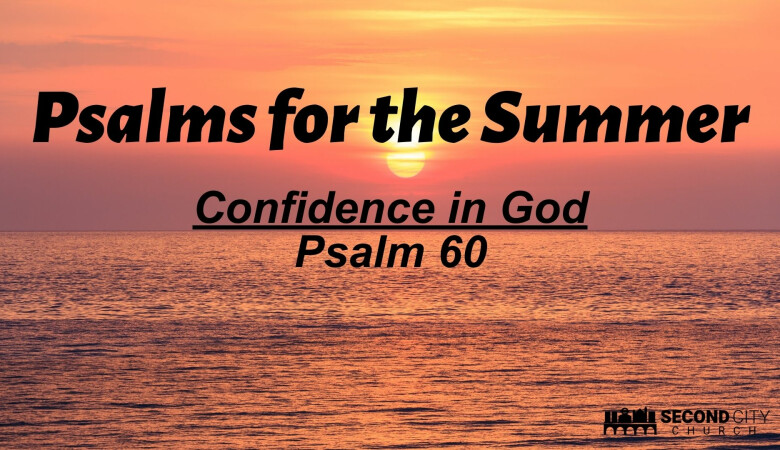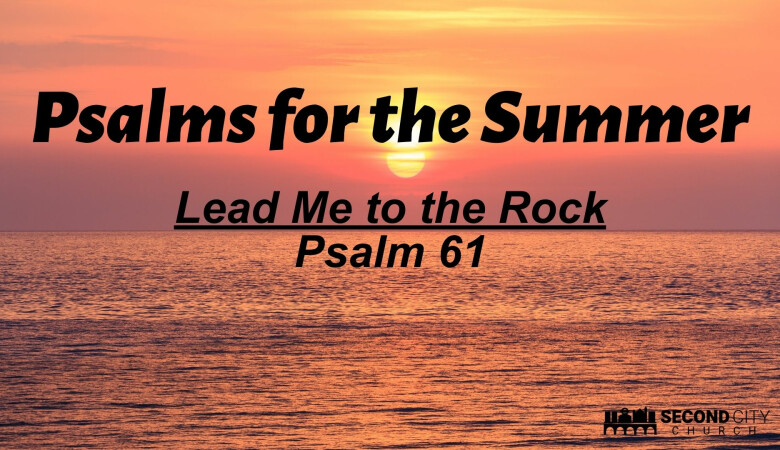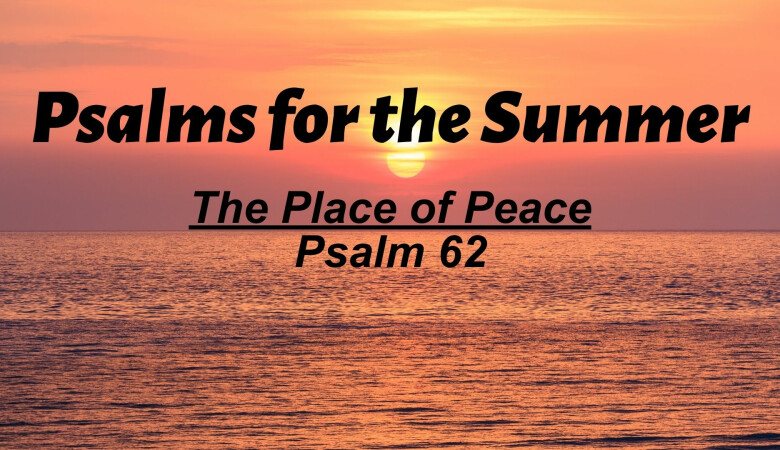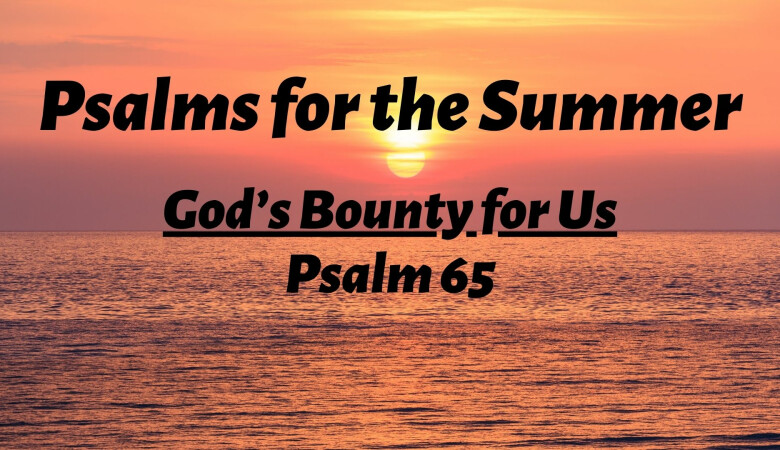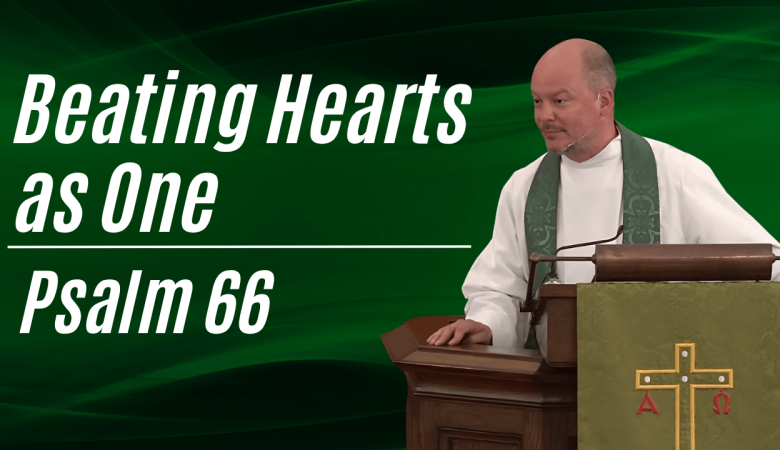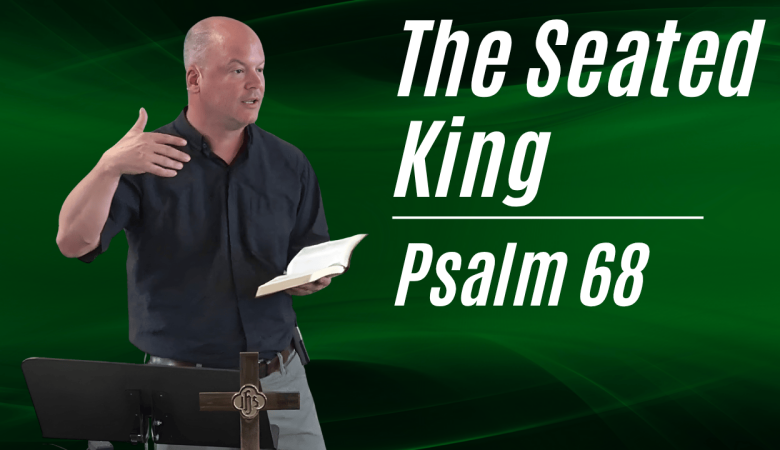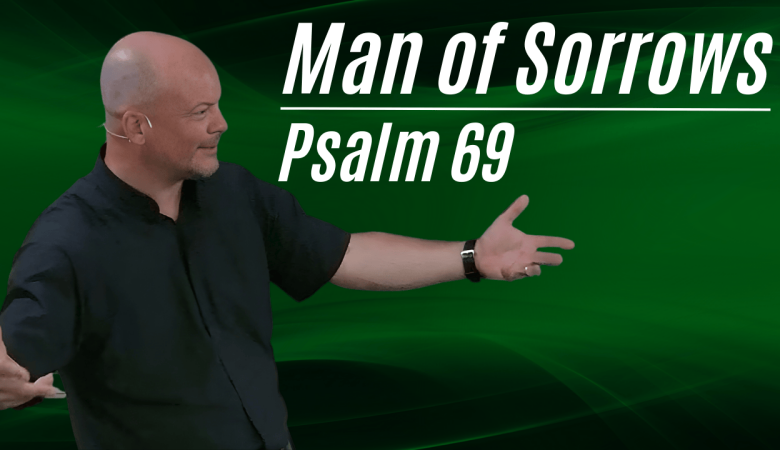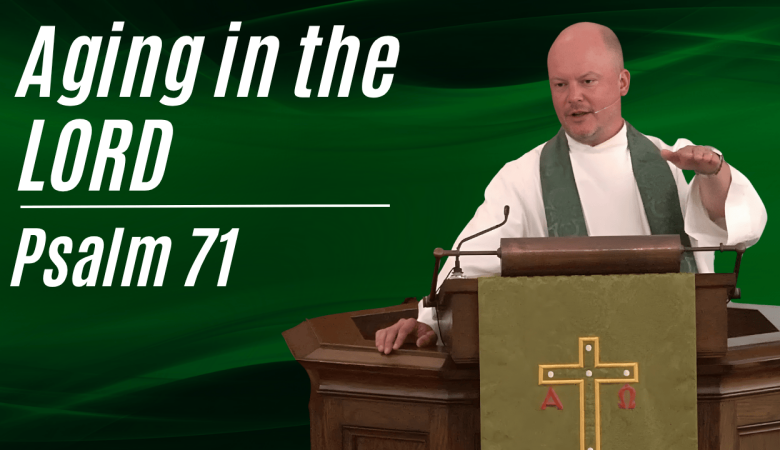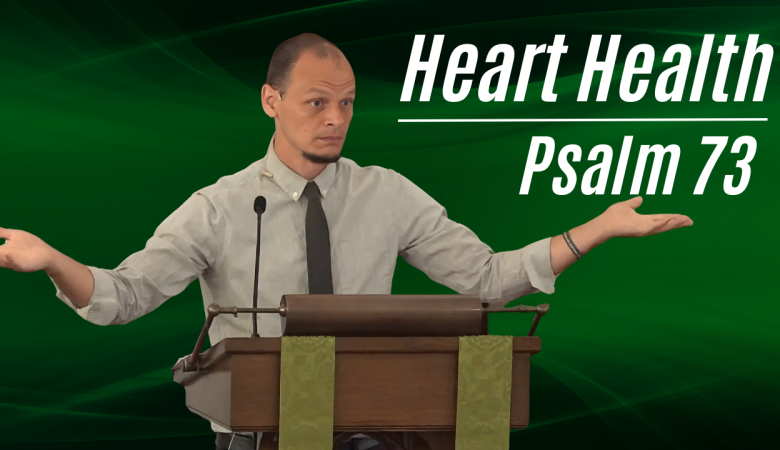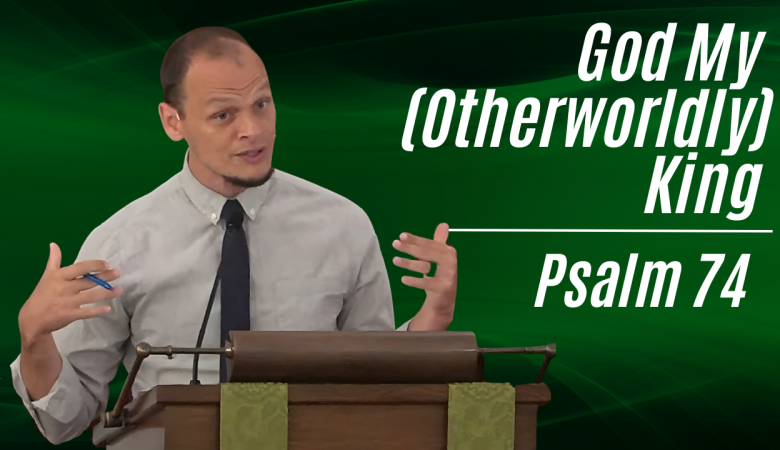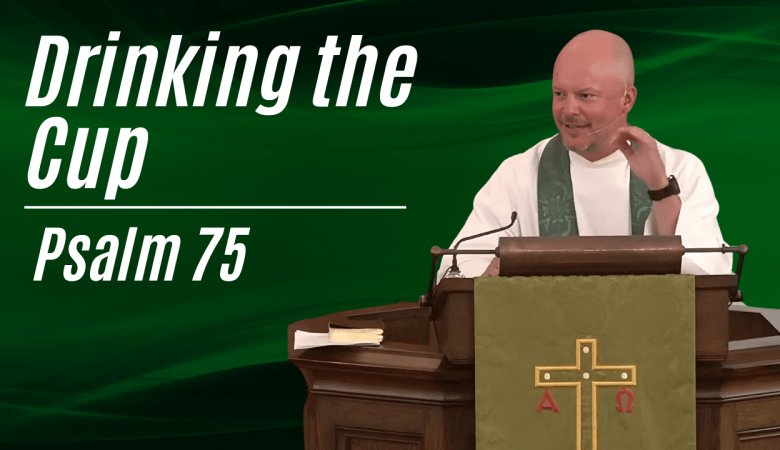Series: Psalms for the Summer
Hasten to Me, O God!
July 20, 2025 | Peter Rowan
Passage: Psalms 70:1-5
Summary
Psalm 70 represents one of humanity's most fundamental expressions - the cry for help. Opening with 'Make haste, O God, to deliver me,' this prayer has been a cornerstone of Christian tradition for centuries, appearing at the beginning of many prayer practices. The psalm acknowledges our need for deliverance from external threats, difficult relationships, and even from ourselves when we become part of the problem.When facing difficulties, we often look for salvation in the wrong places - seeking validation in human relationships, attempting to control our circumstances, or numbing ourselves through various distractions. However, Psalm 70 reminds us that the Lord alone is our true salvation. Early Christian writer John Cassian even advised believers to meditate constantly on this verse as a reminder that salvation cannot be found elsewhere. What makes Christianity distinctive is that God answers our cry by giving Himself completely through Christ, rather than demanding more from us. This psalm can become a meaningful refrain in our daily lives, helping us identify false saviors, bring our unfiltered selves to God, and recognize His faithful response to our needs.
Transcript
Opening Prayer
We pray again, Lord God, we thank youk again for your word. Lord, we thank youk for the beauty of it and the depth of it and how it speaks to so many different experiences of our lives. We thank youk especially for the Psalms, this, this insight into our hearts. I think of the great John Calvin saying that it spans the whole gamut of emotions, that all of them can be found here in this, this songbook that we have in your word, God, I pray that as we turn to it this morning, that we would see its beauty. But more than that, your beauty. Pray in Jesus name. Amen.
The Peter Rowan Story
Okay, so when Melissa and I first went out on a date, I'm not going to tell you all about it. It's so good you all have heard stories, I'm sure. Hopefully it's worth telling for another day. When we first went on a date, she told her parents that she went on a date with Peter Rowan, this guy, Peter Rowan. So as wise parents do, they got on the computer and googled, who is this Peter Rowan?
And we were living in Richmond at the time, so they googled Peter Rowan, Richmond or something like that, and his picture popped up. Born in 1942, recently inducted into the Bluegrass hall of Fame. You know, of famed, actually. He does a lot of Hawaiian folk too. I hope you all know who Peter Rowan is. He's one of the greatest bluegrass guitar players and he's not me.
The U2 Album Cover Story
Some of you may know this. There's a little boy whose picture is on the front of two of U2's first albums. Actually the first and the third album. The first album is the album boy and the third album of U2 was the album War. Interestingly, that boy actually made a. There was an EP that came out before their first album in 1979, and he was also on the front cover of that. That little boy's brother was good friends with Bono. That little boy's brother fronted a punk band out of Dublin called the Virgin Prunes. And that little boy and his brother were neighbors with Bono growing up. And so they asked this six year old little boy, can we take your picture for our album?
And according to the article that I read, he was like, I didn't even really know what was going on. It was fine with me. And now he's famous. That little boy's name is Peter Rowan. And I have been asked if I was bound for musical fame. You all know the answer already. The answer is no.
Confusion and Clarity
The interesting thing as I think about that story with Melissa's parents, is that confusion around rather simple things can be sort of easy, and yet there's also a clarity. There can be a simplicity and a clarity to things.
U2's Song "40"
One of the greatest, one of my favorite songs by U2, and I think actually maybe Chris Gacy's favorite song, he's not here this morning, so I can't hear or see a nod from him. But we've talked about this before is U2's song 40, which is on that third album, War, where Peter Rowan is on the front cover with the little helmet. Maybe you know it. It's actually from Psalm 40. It's the first three verses of Psalm 40.
I waited patiently for the Lord he inclined and heard my cry he lifted me up out of the pit out of the miry clay I will sing right, Sing a new song and it keeps going. I will sing Sing a new song, how long? Sing this song and it keeps going. Beautiful song recounting those first few verses of Psalm 40. And it says this again and again throughout the song.
The Fundamental Human Cry
I will sing sing a new song. How long? And in some ways, I want to say that this refrain there is basic to the idea of Christian faith, that God meets us in our waiting. Hasten, O Lord, don't tarry. He saves us in our calling out to him. And he gives us new life and a new song. He puts a new song on our lips and our mouths. You could also say this is a fundamental human cry.
And actually, this is what I'd like to suggest to you, if you're not a Christian this morning, that this sort of Christian cry of save us, O Lord, is actually a fundamental human cry. How long will life be like this? Would something please change? How long? Please put a new song in my mouth. It's a fundamental human cry. It's a fundamental religious cry. It's part of the way, sort of human existence, religious existence.
7-11 Songs and Repetition
I know because I've existed in the church all my life, that there are different thoughts and feelings about songs that repeat themselves a lot. I don't remember when I first heard this phrase, but it's not going to be lost on any of you, that there are songs that you can term, and this is most often used dismissively, unfortunately, as 711 songs. Y' all know this. These songs have seven words, and you sing them 11 times. There's 711 songs. But here's what I want to tell you also, is that there's something deeply, deeply powerful about these songs that we sing again and again.
They shape us and they give expression to what's happening deep within us. You Know I will sing Sing a new song. How long to sing this song? How long? That repetitiveness, in a way, and that repeating that same idea is getting at something. Why, you know, that is so fundamental to our heart's cry and our human desires.
Psalm 70 and Its Connection to Psalm 40
So today we're in Psalm 70. And Psalm 70 is nearly an exact quote from Psalm 40, verses 13 to 17. It's almost exact. Both are of David. And it's sort of as though David is looking at Psalm 40 and he's thinking, that's a great song. And you know what? This part right here needs to be sung by itself. Again and again.
He's saying, sing it again. Don't rush past this. Don't speed through it. Let it sink in. Sing it again. It's as though, you know, David's actually hearing you two sing how long to sing this song? And he says, well, a little bit longer. Keep going. So what's this song from? It's in Psalm 70. That's a repetition of the last verses of Psalm 40.
What I want to suggest to you is in some ways, this song is just this very fundamental human cry for help. And it's saying that this fundamental human cry that we all have for the world to be right for us to be helped is only met in the Lord.
The Human Cry for Help - Psalm 70:1-3
Okay, so the human cry for help. Look with me there at the first few verses. Make haste, O God, to deliver me. O Lord, make haste to help me. Let them be put to shame and confusion who seek my life. Let them be turned back and brought to dishonor, who delight in my hurt. Let them turn back because of their shame, who say, aha. Aha.
What I'm suggesting is that this is a very fundamental idea. Not necessarily that you're crying out to the true God who brings true salvation, but there's a fundamental thing that says, help. The world's not right. Help.
Traditional Christian Prayer
Near the beginning of most of the great traditions of Christian prayer, right at the beginning of morning prayer, the minister leads the people with what I led you this morning. Oh, Lord, open our lips. And the people say, yeah, yeah, I think you got it. I took you off guard. You can turn with me to the beginning there. Let's just do it again together, quickly. Oh, Lord, open our lips.
That is from Psalm 51. That little. Those two lines are from Psalm 51. And then the next part is this. Oh, God, make speed to save us. Yeah. That is from Psalm 40 and Psalm 70. Fundamental beginning Christian prayers said again and again, day in, day out, hour out, hour in, hour out. And I want to suggest to you that that was in the wisdom of the great prayer tradition, because this is a fundamental human cry, something that is on our lips constantly, a refrain that keeps coming up. Most of our days and hours and minutes, most of our energy is actually spent in the cry for deliverance.
And that's not. I don't think that's hard to think about why that's the case. It's not hard to kind of look out in the world and say things are not right. Things are not as they should be.
Examples of Things Not Being Right
Melissa and I and the kids were talking with a woman this week who had worked downtown for years at Nocturnal as a bartender, and she was telling us why she left and how much she wanted to leave. Though she had worked there for years. She told us some crazy stories about what had been happening out on Second street between 2 and 5 in the morning. Some sad stories and some honestly scary stories. But here's the thing. We know that it's not just late night, right? Not just late at night, but we look out in the world. We say the world is not right. God deliver us, make things right.
Who Seeks Our Life?
When we hear verse two, let them be put to shame and confusion who seek my life. We might think of things like downtown at 2am, 2nd street at 2am or we might think of, I don't know, politicians that we can't stand or, you know, you have kind of your vague others. But often I think we think of actually closer relationships. We can actually think often of how sometimes marriages fall apart because it seems as though the spouse is the one who's seeking your life, engaging with the other as though they are the enemy to be put in their place. The other is out for their harm. Sometimes they're using life and using you for their own ends, and you just can't live in that kind of space.
That's true often. Sadly, another thing that is true is that spouses sometimes, often engage with one another as though they're supposed to be the savior. You know, they're there to make the money, to provide for children, to provide someone with children, to meet all of the emotional needs. And when they don't, right, when they don't let them be put to shame and confusion. It seems like they're seeking my life or they're not giving me the life that I want.
The world is simply not quite right. We often look to one another as though others are out to seek our life or our harm or they're supposed to be our saviors. And when they're not, we act as Though we are out to get them.
Neighbor Relationships
Maybe it's not marriage relationships that come to your mind. Maybe it's your neighbor relationship. It's not easy to share a wall with others. We have some of those relationships. It's also not always easy to share a lawn that abuts with another or just a property line. My parents grew up on three and a half acres and the cops were called on us a lot, probably because our neighbor was schizophrenic and claiming that we were naked out on our front porch when we were asleep in bed and weird stuff like that. But, you know, that's what I'm saying. Like, there's just, like, what. What's happening. The world's not right now. You want to hear that story? It's for another time.
You know, maybe it's the boss who somehow. And you genuinely don't know how you got put on their bad list. It's just not that hard to look out in the world and say, like, this is not how it's supposed to. God save, make haste, come to our aid.
Those Who Delight in Hurt
Now think about this next line. Okay, Verse three here. Well, actually the second half of verse two. Okay. Let them be turned back and brought to dishonor. Who delight in my hurt. Delight in my hurt. Last week we were looking at Psalm 69 and we talked about how the hurt actually in Psalm 69 seems to be coming from those with inside the community of faith. It's like those who are in church with David.
There is a lot of hurt that happens in the Christian church. Some of it's really, really serious hurt. Physical abuse and sexual abuse, spiritual abuse seems to run rampant. There's too much harm in the church, that's for certain. I recently learned of a pastor that I know, a friend of mine, somebody I've traveled with, who was deposed because he embezzled a lot of money from his church. It's just common. It's painful. And what does that do to the person in the pew, Right? Horrendous things for one's faith.
Hurt should never be diminished. There's crazy stories of hurt, but, you know, there's those extreme examples.
Ordinary Church Hurt
Then there's just like the normal kind of thing that happens in a lot of churches where people stop talking to each other and stop really engaging with one another because they parent differently. Or you send your kid to that school, you send them to a Christian school, you send them to a public school, you homeschool your kids, and there's just this distance that's created who delight and hurt. They Bring shame on others. People that delight in their own gain, the misfortune of others, maybe all the delight and gain that they receive is just simply parental superiority.
That's so common. Parental superiority is just unbelievably rampant. It's common in the church. These are a lot of things that David is crying out against in Psalm 69.
Questions About David's Harsh Words
But then last week, we considered a little while, for a little bit, the end of David's complaint and his wish of misfortune on the others who are doing these things to him. And I got a few questions about this last week. So I sort of want to talk about it a little bit in this sermon. And I also think it kind of makes some sense here in Psalm 70. And that says, what do we make of David writing things like this?
Let them be blotted out of the book of the living. And I know I got a number of comments saying, did you. Or people saying, did you use the swear word last week in your sermon? I did, but if you listen, it was used appropriately. I don't. I hope you didn't have to have some hard conversations with your children about that. You might have anyway. Let them be blotted out of the living as though dismiss them. Do away with them entirely and in terms of their salvation. And then also we know in Second Peter, Chapter three that we say, the Lord does not desire that any should perish.
So what do we do? And I think we can say a few very important things. And I want to say these things here. Okay? I think we can say some important things about this.
God Wants Your Unvarnished Self
The first thing that I want you to hear is that the Lord, this is one of the things that we learn in the Psalms. The Lord wants your unvarnished self. Okay? God wants you raw, meaning he doesn't want you to hold back anything from Him. He. He wants you to come to him, even in your deepest indignation, even in your deepest places of rage. And in his perfect love, he will cast out fear. Perfect love that casts out fear invites you to be present in who you are completely. Okay?
And that's part of what the Psalms are telling us. Bring all of you to me, even the places of your deep rage. Come and share to me that experience. Don't hide anything.
But God Doesn't Want to Leave You That Way
But we can also say, and this is part of what I was saying a little bit last week, but I want to say this again this week because I think it does tie in a little bit here. While God wants us raw and why he wants our unvarnished selves, he does not want to leave us that way. You get that he doesn't want you to sit in that kind of anger that says to another, you should have your name removed from the book of life.
Let them be blotted out of the book of the Living. And partly why he doesn't want to leave us that way is because it's not good for us. It's not good for us if we dwell in that place. Proverbs 11:17 says this. A man who is kind benefits himself, but a cruel man hurts himself.
It's like Thomas Chalmers saying, unforgiveness is the poison you drink, hoping another will die. Proverbs 25:28 says, A man without self control is like a city broken into and left without walls. God doesn't want to leave us in those places.
Looking Inward
And I bring all this up because here's the thing. Sometimes it's easy to say the world is not right and look at the havoc that comes about because of it. And you look at the big picture and you look out there and you say, oh, it's Second street at 2:00am or you look at sort of just your spouse, or you look at the other people around. And one of the things that the Bible says very clearly is that often you have to actually say, lord, save me from myself.
God wants you, all of you, real and raw you. But often we're the ones that are saying aha, aha. To our own detriment, to our own harm.
What Do We Do With Our Need for Saving?
So what do we do with all this need for saving? Well, of course I'm going to say that the Christian life says, go to the Lord, cry out to him. And when you do so, you will say, oh, great is our God.
But I suggested that we often, you know, we look out in the world and we see what's wrong, and we see what's wrong in our spouses and we see what's wrong with our neighbors. And sometimes we see what's wrong with ourselves. And what we're doing is we're seeing this need for something to change, for salvation to come. And what I want to suggest to you is that that's just a human experience. That's not a Christian experience. That's not unique to somebody that says, jesus is Lord and great is God. Everybody actually has that experience. Everybody has the experience of saying something needs to change. And sometimes they see, I need to change, the world's not right.
Where People Seek Salvation
And sometimes when we see that, when we know our need for salvation and our need for God to be present, to do something, sometimes we move to places that we should move to human relationships that can bring a degree of healing. That's true. Human relationships can be amazingly healing and helpful. God made us for community. That's true.
Sometimes, though, that healing and that help grow in us to the temptation to think that we can kind of figure it out, we can do it just each other sometimes. Sometimes we go to salvation towards others and we end up looking just for their own approval. Think of the girl in middle school who's just desiring that somebody else say, hey, you look good today. Rather classmates primarily. That would be their salvation for the day that salvation is fleeting.
Do they think I'm all right? The nagging communal question. We look to our children to validate our adult selves, don't we, parents, with words like this inside, at least I'm a good enough parent that my kids still talk to me. And those words sort of bring this sense of maybe something at least somewhat is right. But our human relationships can't be our saviors.
Seeking Control
So what we often do is we seek control, don't we? We do this either through just organizing everything, making sure everybody says the right thing is on time. And just like external control, oftentimes we do this by simply being stingy and not giving away too much. Stingy with our emotions and our time and our energy. We've been hurt too much.
Some of you know, Lewis, saying what you do often is you put yourself in a casket and what happens is you become hardened in that kind of scenario, which adds only to the brokenness and the need for salvation. Sometimes we seek control by power, right? Salvation by legislation. Man, that is a popular one. And I don't care what side of the aisle you are on, you are tempted to think that that is what will bring your salvation.
Throwing Up Our Hands and Seeking Sedation
What often we do with our need to be saved, where we often go with this need to be saved is actually sort of throwing up our hands and saying, I can't do anything, and I don't know who can do anything. And so what I just need to do is just be sedated.
We can't take all that is wrong in the world. We can't bear it. We can't sort of deal with it. We don't know what to do with it. And so, like Dave Matthews sings in the song Too Much. And yes, I did have this thought as I was listening to him this week, I eat too much, I drink too much, I want too much, too much. And we just do it again and again, again.
And of course, we can admit that, like shopping therapy gives Us a little like boost, little bit, right. Ah, that felt good. Ah, that food met some of my need. But often those become our sort of sedatives, our distractions, things that numb us from the incessant need for salvation from all that is wrong in the world.
The Christian Response
I want to say again that this psalm is a fitting refrain for the church. It makes sense that the beginning of this psalm is that beginning prayer of Christian communal prayer, right? O Lord, make speed to save us. Lord, hasten to us.
Because what Christians say is that it's true, we're tempted to go in all these other directions. And we do this so often too, right? It's partly why we have times like confession. What do we do with our sin, with the sin of others, with the massive need of salvation? Well, we Christians do this thing. We try to control other people. We try to use other people. Maybe their affirmation, their words can make us feel better about the world and ourselves. Or maybe we can just. We sedate.
And yet we need to say again and again, the Lord alone is our salvation. He alone comes to us properly in our aid or in our need, and comes to our aid.
John Cassian's Teaching on Constant Meditation
So, John Cassian, maybe you read through the meditation quote, but I'm going to read parts of it. He's writing in the early 5th century and he says, meditate constantly on this verse. By the way, this verse is Psalm 70, verse 1. Make haste, O God, to deliver me. O Lord, make haste to help me. Meditate constantly on that verse in your heart. You should not stop repeating it when you're doing any kind of work or performing some service or on a journey. Meditate on it while sleeping and eating and attending to the least needs of nature.
This is all the time because. Because the temptation of our hearts is to look elsewhere for salvation and it cannot be found anywhere else. He says this. It contains an invocation of God against every danger. It contains humble and pious confession that we cannot do, contains the watchfulness of anxiety and continual fear. It contains the thought of one's own weakness, confidence in the answer, and the assurance of a present and ever ready help.
The Song of Life
What I'm suggesting to you is this psalm that David, in his great wisdom, being led by the Holy Spirit, took out of this other psalm in a way and said, we need to sing it again. Is the psalm, the song, the cry of life, God save me, God help me. And the response is that God does. He comes to us in our need. He always meets this cry in his perfect timing.
Think of Mary and Martha. If only you were Here, Lord, my brother wouldn't have died. God comes to us always in our need, in his timing.
The Universal Human Cry
Friends, here is the song, the song of our lives. This cry for salvation suggested that kind of all religions in some ways are based on this idea. The world is not right. Something needs to be done about it. And that's because this is simply a human response to wrongdoing in the world, a human response to our own wrongdoing, the ways that we've been sinned against. This is a human thing. Cry for salvation. The cry for salvation will not go away.
And that's, of course, why we see it all over the world still today. Some people have written rather recently about the diminishment of religious practices in the United States has actually been. It's corresponded to the increase of engaging with politics as your religion. And so the religious fervor actually just transfers to political fervor. Because it's a human thing. We long for salvation, for the world to be put to right. The heart that seeks salvation is not changing.
This is also why David Foster Wallace says, there is no such thing as atheism. There's no such thing as not worshiping.
The Christian Difference
But for Christians, we have the same cry as everybody else, but it's directed Godward, directed towards the true and the living God who's revealed himself in Jesus Christ. The Christian song is a cry for help that is met with the cross and the resurrection of Christ Jesus. What we have in Christ is that God answers this prayer, this deep human longing with his very self.
And this is unique. Other places that you go to for salvation, they'll eat you alive, Wallace says. The earth, Wallace says, they eat you alive. But the Christian God says, I will give you life. Where there was once death, other forms of salvation say, give me this, give me this, give me this. Christianity says, I'm going to give you up myself completely.
The Eternal Refrain
This psalm is the refrain of the Christian life. Here's the interesting thing that in a way, this song is going to be sung again and again and again. Not as the present need for help, but the fact that God has helped in the new heavens and new earth. In the little glimpse that we have in Revelation, we have this song being sung by the multitude of heaven, saying, worthy is the lamb who was slain. Worthy is the lamb who was slain. Which is to say, worthy is the God who heard our cries for help and gave his life that we might have life.
Returning to Peter Rowan
Let me circle back for a minute, then I'll close to Peter Rowan. Not me, the one whose name is spelt Wrong. R, O, W, E, N, which is the one that's on the U2 albums. So I was reading about him this week and he's a photographer. He was six years old. He was asked to be on the front of these covers and he says, I don't really remember it that much. You know, it's just like my brother's buddy who was starting a band and Nobody knew about U2 anyway. And, you know, I was just taking pictures. But he said that beginning thing. Actually, this is the interesting thing.
He still takes pictures for bands. One of his main things is being a photographer for musicians. But here's the interesting thing. I want to leave you with this. That thing which started his life in a way early on, just a six year old, is still, in a way defining him. It's still orienting his life and friends.
The Beginning, Way, and End
That is this psalm. This is the beginning of the Christian life. Lord, help me. And God says, amen, I'll help you. That's what this psalm is. Lord, I need you, make haste to help me. This psalm saying, God's going to come to you. This is the beginning of the Christian life. This is the way of the Christian life. This is the end of the Christian life. Oh, Lord, make haste to help me. And God comes.
Closing Prayer
Let me pray. Lord, thank you for the psalms. Thank you for Psalm 70. Lord, thank you that in your perfect providence, through the working of your spirit, David took that other, those other verses and said, give your attention to this. God, thank you for the refrains of Christian singing. Thank you for the repetition of U2's song. How long, how long, how long. That helps us to ache a little bit more because we've sung it again. And God, thank you that in this psalm is our life and how you meet us in our need. In our Lord Jesus Christ, it's in his name we pray. Amen.
Series Information

Every summer Peter and an occasional guest speaker take us through the Psalms. Of the Psalms Luther said " the Psalter is a book of all the saints, and everyone, whatever his situation may be, finds psalms and words in it that fit his situation and apply to his case so exactly that it seems they were put in this way only for his sake..."




